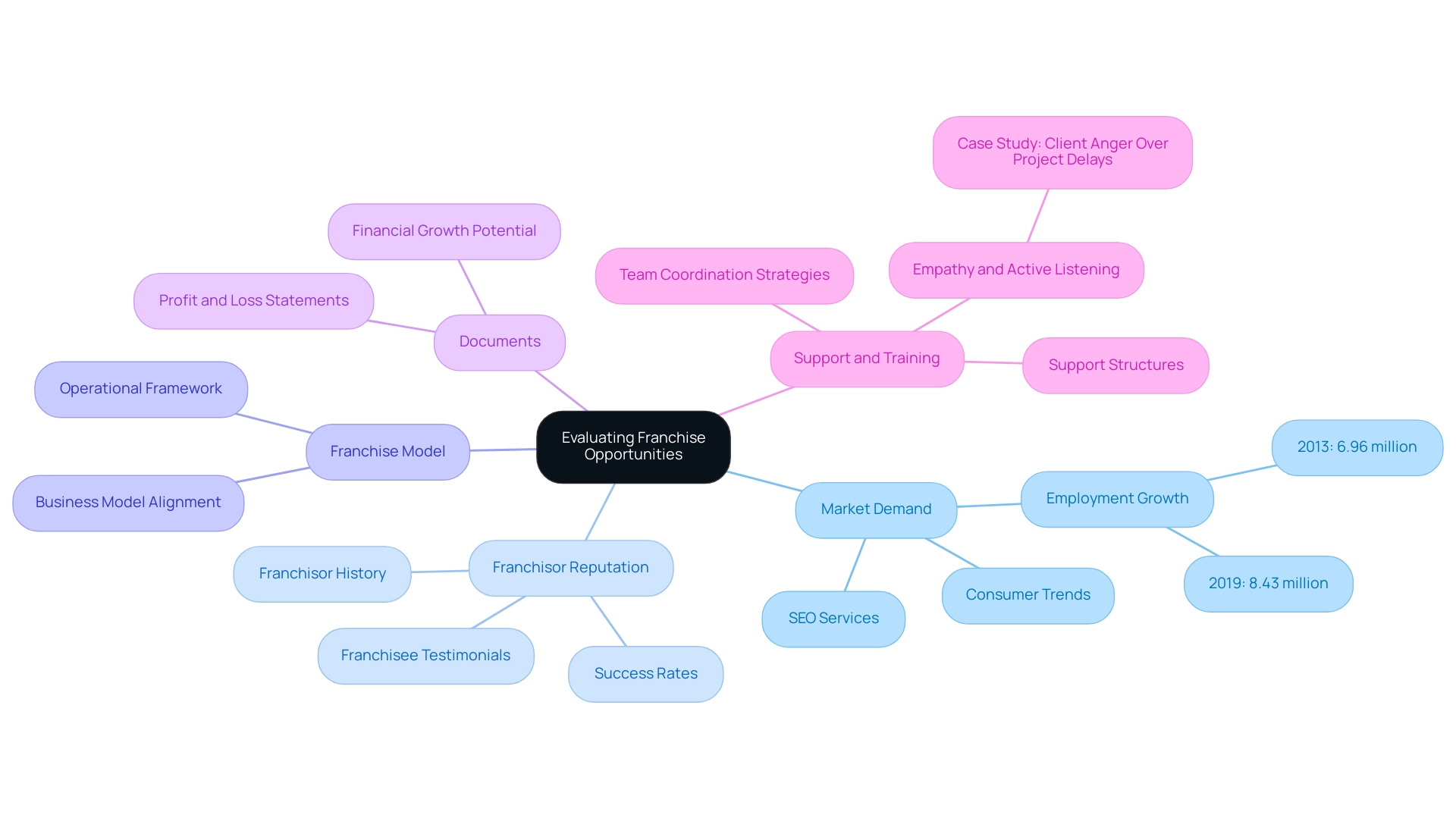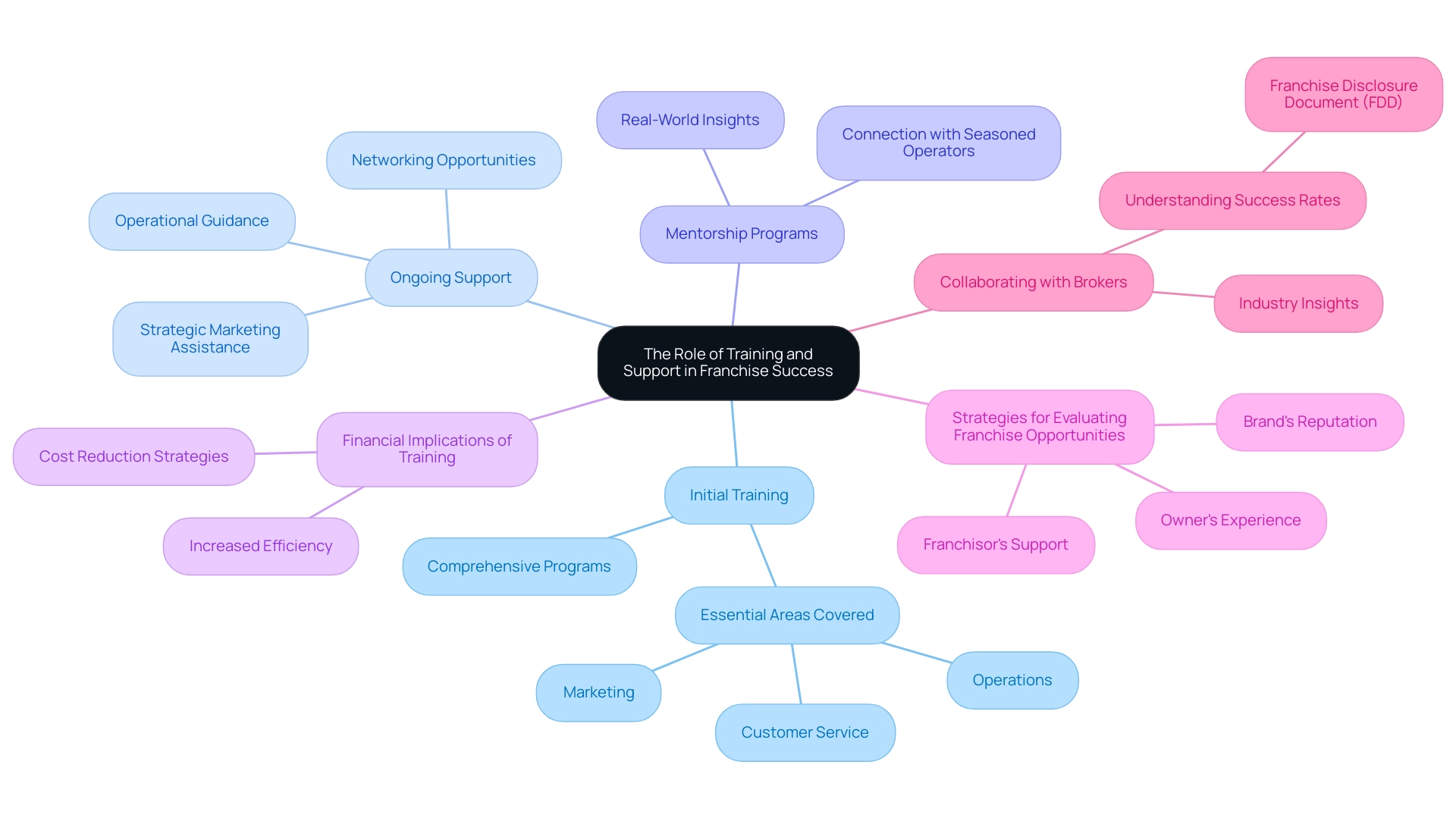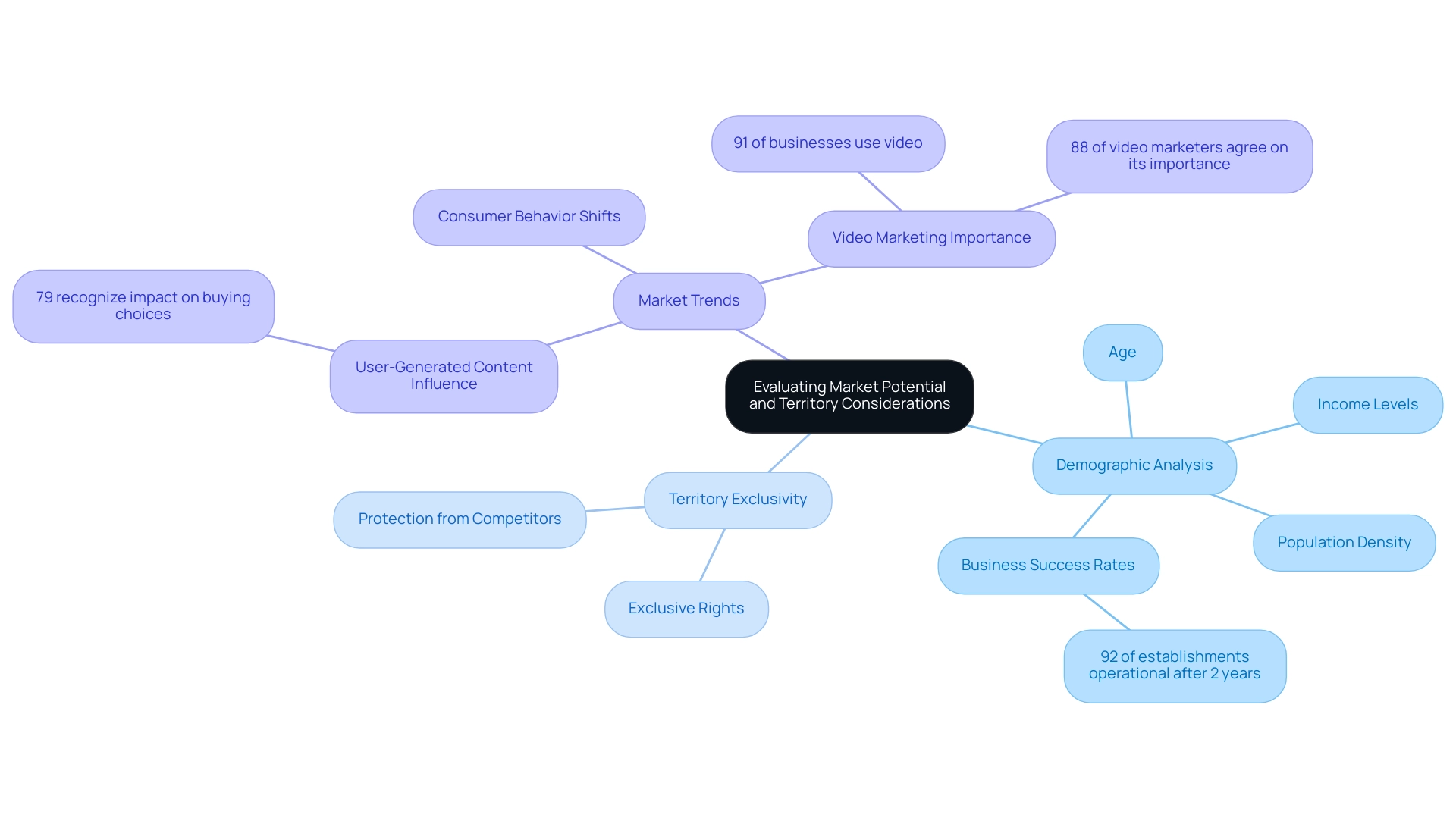Overview
The article outlines best practices for evaluating franchise opportunities, emphasizing the importance of market demand, franchisor reputation, and comprehensive training and support. These factors are critical as they directly influence a franchisee’s potential for success and profitability, with evidence showing that strong support systems and a thorough understanding of financial commitments can significantly enhance business outcomes.
Introduction
Embarking on the journey of franchise ownership can be both exciting and daunting, especially for those new to the entrepreneurial landscape. With a multitude of opportunities available, potential franchisees must navigate a complex web of factors to ensure their investment aligns with their aspirations and goals.
From understanding market demand and evaluating the franchisor’s reputation to scrutinizing financial commitments and legal obligations, each element plays a crucial role in determining the likelihood of success.
This article delves into the essential considerations that aspiring franchisees should keep in mind, providing valuable insights that empower informed decision-making in the pursuit of a rewarding franchise venture.
Key Factors to Consider When Evaluating Franchise Opportunities
When assessing a business opportunity, it’s essential to consider several pivotal factors that can significantly impact your success:
- Market Demand: Investigate whether there is a robust demand for the products or services provided by the business. Trends in consumer preferences and competitive analysis are key components of this evaluation. Significantly, the industry has experienced employment growth from 6.96 million individuals in 2013 to over 8.43 million by the end of 2019, indicating a thriving market. Additionally, utilizing SEO services can improve your visibility and draw more customers, further supporting market demand.
- Franchisor Reputation: Delve into the franchisor’s history, paying close attention to their achievement rates and stability within the industry. Engaging with current franchisees and reviewing their testimonials can provide invaluable insights into the franchisor’s credibility and operational support. Recent statistics indicate that businesses with strong reputations tend to have higher success rates, making this an essential area of focus.
- Franchise Model: Understanding the specific business model and operational framework of the franchise is crucial. Ensure that it aligns with your personal skills and interests, as this will be fundamental to your satisfaction and success.
- Documents: Scrutinize the monetary records made available by the franchisor, such as profit and loss statements. This assessment will help gauge the potential for profitability and financial growth within the franchise.
- Support and Training: Evaluate the support structures established by the franchisor. Effective strategies, such as maintaining team coordination during network outages, can make a significant difference in daily operations and overall success. For example, a case study on managing client frustration regarding project delays emphasizes the significance of empathy and active listening, which are essential elements of effective communication and support in business operations.
By focusing on these essential factors, aspiring business owners can utilize strategies for evaluating franchise opportunities that align with their career aspirations and objectives.

The Role of Training and Support in Franchise Success
Success in franchising is intricately linked to the quality of training and support that franchisors provide. To navigate this landscape effectively, consider the following critical components:
-
Initial Training: Seek businesses that offer comprehensive initial training programs. These should encompass essential areas such as operations, marketing, and customer service, equipping you with the skills necessary to manage your business successfully. A robust training foundation is crucial for new franchisees, as it sets the stage for future success.
-
Ongoing Support: Continuous support from the franchisor post-opening is vital. This can include operational guidance, strategic marketing assistance, and opportunities for networking with fellow franchisees. A strong support network can bolster your confidence and help you overcome challenges as they arise.
-
Mentorship Programs: Some franchisors provide mentorship opportunities that connect new franchisees with seasoned operators. This relationship can be invaluable, offering insights and advice that come from real-world experience. As American Family Care emphasizes,
Our business plan capitalizes on multiple urgent care revenue streams with our variety of services, which make us the go-to clinic in communities across the U.S.
This highlights the importance of understanding the broader operational context.
-
Financial Implications of Training: Notably, training is the top response for how operators plan to reduce food costs in the next 12-18 months. This illustrates the financial benefits of investing in training, as it can lead to cost savings and increased efficiency.
-
Strategies for Evaluating Franchise Opportunities: It is crucial for prospective franchisees to research factors such as the owner’s level of experience, the franchisor’s support, and the brand’s reputation. These components greatly affect the probability of achievement and should be carefully assessed prior to making an investment choice.
-
Collaborating with Brokers: Furthermore, collaborating with a broker can offer important industry insights and assist prospective business owners in comprehending achievement rates via the Franchise Disclosure Document (FDD). This practical resource can guide you in making informed decisions.
Investing in a business opportunity that emphasizes strong training and support will significantly enhance your chances of success and overall satisfaction. Additionally, recent studies indicate that effective compliance training can boost engagement and retention by as much as 50%. This statistic highlights the critical nature of training in the business ecosystem.

Understanding Financial Commitments in Franchise Opportunities
Before deciding to invest in a business, it is crucial to thoroughly understand the various financial commitments involved.
- Initial Investment: This includes the total initial investment needed, which encompasses fees, equipment purchases, inventory acquisition, and potential real estate costs. For instance, the luxury Woodhouse Day Spa business requires an initial investment ranging from $1,231,617 to $1,833,067, reflecting the premium nature of their services.
In contrast, ZIPS Dry Cleaners, established in 1996, provides a more accessible entry point with an initial investment ranging from $739,700 to $1.175 million, showcasing the variety in investment options.
- Ongoing Royalties: Be mindful of ongoing royalty fees, generally calculated as a percentage of your sales. These fees assist the franchisor’s marketing and operational services, offering essential resources for the success of the business.
Understanding these fees is vital, as they can significantly impact your profitability over time.
- Marketing Contributions: Many franchises mandate contributions to a marketing fund, which is utilized for both national and local advertising efforts. This can significantly influence your brand visibility and customer acquisition strategies.
- Additional Costs: Don’t overlook other potential expenses that may arise, such as insurance premiums, utility bills, and employee salaries. These expenses can accumulate and affect your overall economic well-being. Franchising offers accessible business opportunities across different budgets, enabling individuals to discover a venture that matches their economic capabilities.
Grasping these economic elements will enable you to develop strategies for evaluating franchise opportunities and assess their feasibility in relation to your monetary goals. Glenn Burrell emphasizes the importance of due diligence:
To make sure you do the due diligence. Research the business model thoroughly.
If you can afford to overfund, especially with a 401(k), do so. It’s better than getting cut short.
With a clear grasp of these financial aspects, you’ll be better equipped to navigate your business journey.

Evaluating Market Potential and Territory Considerations
When starting the journey to assess business opportunities, it’s essential to explore several key factors that can significantly affect market potential and regional achievement:
-
Demographic Analysis: Conduct thorough research on the demographics of the territory in question. Understanding factors such as age, income levels, and population density is vital for ensuring that the local market aligns with the business’s target audience. For example, with business success rates indicating that around 92% of establishments stay operational after two years, a strong demographic fit can be a significant predictor of longevity. As Aku, the Director and founder of Paperchase Accountancy, emphasizes, adapting to the competitive environment is essential for success. By measuring the presence and strength of competitors, you can evaluate the degree of market saturation and the prospects for your business to succeed. Notably, the fact that 91% of businesses utilize video as a marketing tool highlights the increasing importance of visibility in a crowded market, underscoring how critical it is to stand out among competitors.
-
Territory Exclusivity: Clarify whether the business model grants exclusive rights to operate in a particular territory. This exclusivity is critical as it protects your business from competing with other franchisees, enabling a more secure path to success.
-
Market Trends: Staying attuned to local market trends and shifts in consumer behavior is imperative. Adjusting to these changes can offer a competitive advantage, as shown by the 79% of individuals who recognize that user-generated content greatly impacts their buying choices.
By thoroughly analyzing these elements, you place yourself in a position to make informed choices about the venture’s potential for profitability and sustainability in the marketplace, utilizing strategies for evaluating franchise opportunities.

Navigating Legal and Regulatory Aspects of Franchising
Navigating the legal and regulatory landscape of franchising is a crucial step for anyone contemplating ownership in such a business. Here are essential components to keep in mind:
- Disclosure Document (FDD): This document is your roadmap; it details the business’s legal structure, financial performance, and obligations. A thorough review of the FDD is non-negotiable, as it provides insights into possible risks and rewards associated with the franchise.
- Contracts and Agreements: Familiarity with all contracts and agreements is vital. This includes understanding the terms of operation, renewal processes, and termination clauses, which can significantly affect your business continuity.
- Compliance Requirements: Franchise operations are subject to a variety of regulations at local, state, and federal levels. This includes zoning laws and health regulations that could impact your business model and operational capabilities.
- Legal Assistance: Engaging legal counsel with expertise in franchising can be invaluable. They can assist in interpreting intricate contracts and protect your interests, ensuring that you are safeguarded throughout the business journey. By proactively dealing with these legal matters, you can reduce potential risks and facilitate a smoother transition into ownership.
Additionally, understanding consumer trends—such as the increasing focus on convenience, health and wellness, and sustainability—can further inform your decisions and strategies as you embark on this venture. Recent updates in franchise law also highlight the importance of compliance; for instance, in Iowa, franchisors are required to repurchase franchisees’ assets at fair market value, underscoring the protective measures available within the franchising framework.
Helena Webb, our in-house editor, emphasizes the importance of thorough documentation in franchising: ‘A well-prepared FDD can make all the difference in a franchisee’s journey.’ Furthermore, a case study on litigation risks related to domain names reveals that franchisors must preserve electronic evidence and understand the implications of domain name control to mitigate litigation risks, illustrating the real-world implications of these legal considerations.

Conclusion
Embarking on the journey of franchise ownership requires careful consideration of numerous factors that can significantly influence success. Understanding market demand, evaluating the reputation of the franchisor, and scrutinizing the financial commitments involved are pivotal steps. Each element plays a crucial role in determining whether a franchise opportunity aligns with personal aspirations and financial goals.
The importance of robust training and ongoing support cannot be overstated. A franchise that prioritizes comprehensive training programs and provides continuous mentorship can greatly enhance a franchisee’s chances of success. Additionally, understanding the legal and regulatory landscape is essential for navigating potential challenges and ensuring compliance. By thoroughly reviewing the Franchise Disclosure Document and engaging legal counsel, aspiring franchisees can safeguard their interests and prepare for the complexities of ownership.
Ultimately, making informed decisions based on a thorough evaluation of these key factors will empower potential franchisees to pursue rewarding opportunities. With the right preparation and support, the path to successful franchise ownership can transform from a daunting endeavor into a fulfilling and profitable venture. The time to invest in your future is now; by leveraging the insights provided, aspiring franchisees can confidently step into this exciting world of entrepreneurship.


